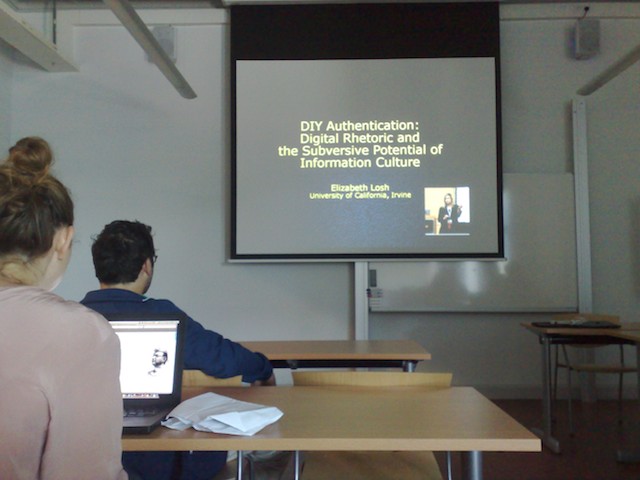On August 31, the first day of the academic year, Elizabeth Losh, author of Virtualpolitik, gave a lecture at the University of Amsterdam. In her talk on “D.I.Y. Authentication: Digital Rhetoric and the Subversive Potential of Information Culture” she describes a subgenre within New Media that deals with new bridges between politics and new media. What is this digital rhethoric? As a mix of politics and aesthetics it is a political science for the new media age which deals with questions of how do political bodies react to new media challenges? It is moving beyond the banal of the political class and their responses to new media, moving beyond opening a Facebook and collecting fans.

As described on her own blog Liz Losh started with
a recap of the chapter in the Virtualpolitik book about satires of surveillance and authentication, which opens with the story of hacktivist Chris Soghoian.
Christopher Soghoian hacker’s work was seriously misunderstood by the government. He developed the Northwest Airlines Boarding Pass Generator as a means to show the flaws in current authentication systems (the boarding pass as an identification object) which are easily digitally reproduced/altered. She framed this case study within the need for authentication and how this has changed in the digital world:
But I also presented some of my newer work that extends the implications of the case studies in that chapter to the changing nature of the social contract in the Internet era and how the lack of an accepted means of authentication makes it difficult to conduct real political deliberations with Web 2.0 technologies. I began by arguing that the focus of public rhetoric had gone from authenticating citizens in the previous administration to authenticating the president in this one, as birth certificate anxieties gripped a particular constituency.
Things have shifted in the tension between content creation and the regulatory body. The government as a content creator is involved in an activity that comes into conflict with its regulatory function. An obvious example are digital files traveling to unintended audiences. Government cannot understand/has a hard time grasping the concept of fan culture which are part of the digital practices of everyday citizens and there tends to be a media illiteracy within the government. The web generators Losh shows are a form of social-political satire and serve as a vehicle for critique. Generators as such can be seen as a web culture genre.
The Kenyan birth generator illustrates the shift from the authenticating government to authenticating citizens in the example of the question of president Obama’s nationality. It critiques the idea that citizens don’t get the same opportunity to authenticate the government or president. Generators play with the concept of authenticity as the case of the Postmodern Essay Generator (PoMoGen) shows which produced an essay that was actually accepted at an academic conference. Like Segoihan who asked if can we spot a fake boarding pass, the PoMoGen questions the verification of human authorship versus computer generation in a Turing Test/Eliza way. This authentication anxiety paralyzes the government and makes it hard to move forward.